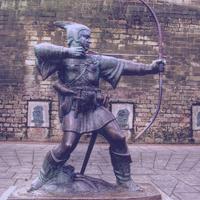Episode 245: The True Story of Robin Hood [2]
Peter's, the largest church in York.
So, while Robert Hod of York is a slightly less plausible character
than Robert Hood of Wakefield, he was actually a confirmed outlaw.
Robert Hod of York could very well have been Robin Hood's namesake,
providing the name and inspiration for Robin Hood as a fictional character.
Another historical outlaw who could have provided
inspiration for a fictional Robin Hood is Roger Godberd.
While his surname, Godberd, is a lot further away from our hero's compared
to the previous two suspects, there are numerous parallels between
his real life career as an outlaw and the details given in the Gest.
For example, Godberd had numerous men at his call in the forest where he was hiding
out and just like Robin Hood, Godberd was wanted by the Sheriff of Nottingham.
The sheriff's men captured him in 1272 but Godberd managed to escape, thanks
to the help of a local knight, not unlike the knight in the Gest of Robin Hood.
However, Godberd was eventually captured again and imprisoned.
Godberd was later pardoned by the King, as was Robin Hood.
So, while Robin Hood is by no means a carbon copy, a clone, of Godberd, there is no denying
that the tale of Robin Hood has a lot of striking similarities with the life of Roger Godberd.
Alternatively, another inspirational figure for the Robin Hood legend is a certain Robert Deyville.
Along with his brother and their kinsmen, their relatives, the Deyvilles
were linked to the Barnesdale area and there is also a mention of
a settlement of a £400 mortgage, the same figure as in the Gest.
Lastly, Robert Deyville's fortified home in North Yorkshire, at a place
called Hood Hill, could have been an inspiration for the name of Robin Hood.
Of course, there is also the possibility that the name Robin
Hood was an alias, or another name that was used for an outlaw.
This could also tie in with earlier suggestions of actual real life people who
may well have provided the basis for the story of Robin Hood, and that all of
these people were possible inspirational figures for the Tale of Robin Hood.
The fact that we do not know whether or not he actually existed adds to
his appeal, and both the man and his story have become the stuff of legend.
A legend that each new generation has sculpted to suit their times, adapted
to suit modern tastes but with a basis in the original text, in the Gest.
And no matter how the story is adapted, the legend of Robin Hood is a persistently appealing story.
Sure, he is an outlaw, a criminal, and especially in some of the
earlier editions, he could be vicious, deliberately violent and cruel.
But there is a moral element to his story.
In early editions it was a semi-religious element, as we can see from his devotion
to the Virgin Mary, and in later editions it's simply about redistributing
property, or wealth, from those who don't deserve it to those who do.
The success of the Robin Hood legend comes from the fact that the figures of authority
and supposed virtue in all of the stories are all worse than Robin Hood himself.
Robin Hood is presented as being an outlaw but those who control the laws
are hopelessly corrupt and devoid of, or with a complete lack of, virtue.
None more so than the greedy monks.
In 16th century England, like in much of Europe, the church
and appointed officials, mainly sheriffs, held all the power.
To a contemporary audience, clergy and officials were fair game; it
was acceptable to make fun of or criticise them because of the sheer
amount of power they held, and for their reputation for corruption.
By portraying the clergy and officials as inadequate hypocrites, as being false and
unable to fairly rule, the story of Robin Hood pokes fun at these almighty, powerful
characters, allowing the audience to have a laugh at their expense, or directly at them.
What's more, the way the haughty, overly proud monks act, makes them appear
to deserve what they get when Robin steals from them or humiliates them.
The incompetence of the Sheriff of Nottingham and any other authoritative characters,
alongside their scheming and secret plans, makes them appear ridiculous, laughable.
Robin Hood, on the other hand, despite technically being a criminal, is admired by the reader.
He is honest, fair, clever and brave - he's everything that the monks are not.
He is the true hero of the story.
And whether or not he ever actually existed, the Legend
of Robin Hood is still alive and kicking centuries later.
So, with dozens of on-screen adaptations, and no doubt more adaptations to come in the
future, there is no sign that the Legend of Robin Hood is losing its popularity any time soon.
OK then, that is it for today's episode on The True Story of Robin Hood.
I hope it's been an interesting one, and you've learned a bit about
the truth, or at least some of the possible truths, behind this story.
As always, I would love to know what you thought about this episode.
Do you have any theories on whether or not there was ever a real Robin Hood?
Who do you think is the most probable subject?
Do you have versions of a Robin Hood story, of someone who
steals from the rich and gives to the poor, in your country?
I would love to know, so let's get this discussion started.
You can head right in to our community forum, which is at
community.leonardoenglish.com and get chatting away to other curious minds.
You've been listening to English Learning for Curious Minds, by Leonardo English.
I'm Alastair Budge, you stay safe, and I'll catch you in the next episode.

